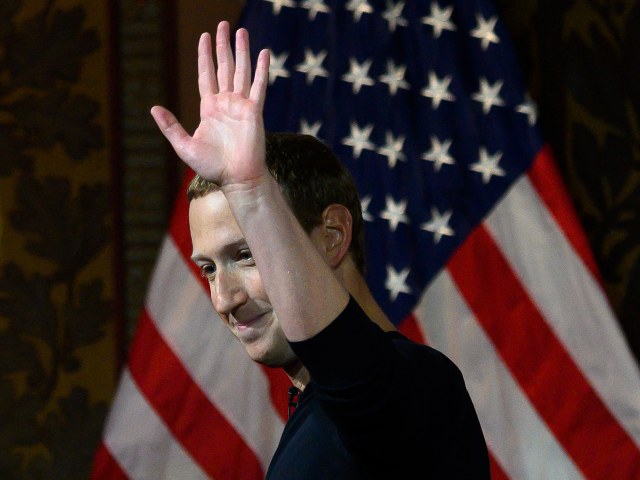If there was a common theme to the Senate testimony of Frances Haugen, the far-left Facebook “whistleblower,” it was this: social media’s habit of using algorithms to “amplify preferences” is bad, wrong, evil, and should be regulated out of existence — by people like her.
Preference amplification is exactly what it sounds like. When you like a post on Facebook, retweet an account on Twitter, or subscribe to a channel on YouTube, the algorithms kick in, delivering similar content to the top of your feed.
Ordinary users, getting to see more of what they like? More of what they’re interested in? The prospect horrifies Haugen.
“Facebook knows that engagement-based ranking, the way that they pick the content… for all users, amplifies preferences,” she told Senators.
“I think if we had appropriate oversight, or if we reformed 230 to make Facebook responsible for the consequences of their intentional ranking decisions, I think they would get rid of engagement-based ranking,” she continued later in the hearing.
“I encourage reform of these platforms, not picking and choosing individual ideas, but instead making the platforms themselves safer, less twitchy, less reactive, less viral.”
Haugen wants less virality and less emphasis on user’s preferences, in favor of a system of content ranking that is “socially regulated” — whatever that means!
It’s no accident that Haugen’s favored “solution” to Big Tech is to attack virality and preference amplification. These are the killer apps of social media, integral to their whole ecosystem.
They are the 21st-century mechanisms that allow ordinary people to obtain extraordinary audiences — audiences that frequently eclipse those of CNN anchors and New York Times columnists.
Founders Fund VP Mike Solana noted that Haugen’s preferred “solution” ends up empowering the establishment media.
repeatedly, the "whistleblower" pushes for legislation that would end the algorithm and bring about "human scale" social media, which is to say large tech platforms would no longer be able to mint influencers capable of competing with the institutional press. interesting!
— Mike Solana (@micsolana) October 5, 2021
“Repeatedly, the “whistleblower” pushes for legislation that would end the algorithm and bring about “human scale” social media, which is to say large tech platforms would no longer be able to mint influencers capable of competing with the institutional press. interesting!”
Getting rid of internet virality would be a huge win for the likes of CNN and MSNBC. They don’t need the Facebook algorithm to reach a wide audience, because they have the resources to broadcast into the homes of millions of Americans (not to mention thousands of airports and hotel lobbies). Print newspapers like the New York Times and Washington Post also have their own extensive distribution networks.
Virality is actually a massive problem for the legacy media, because it allows independent creators to compete with them at a fraction of the cost. If I were an old-school TV mogul paying millions of dollars for a traditional distribution network, watching as some kid broadcasting to YouTube from his mom’s basement gets a million views overnight, I’d be mad too.
That’s what this is all about. Information war. The legacy media’s desperate attempt to preserve its relevance in a world that’s ready to move on. They can’t force people to like them, so they want to make it harder to like anything else.
That’s why they’ve made a celebrity of Haugen, the crusader against virality and “preference amplification.” They are fully aware that when it comes to media consumption, the preferences of a growing number of Americans don’t include them. Heaven forbid that those preferences get amplified!
In fact, there are a growing number of preferences that are problems for the establishment. Preferences against endless wars in the Middle East. Preferences against violent race riots. Preferences against election fraud. Preferences against the latest woke crusade, from critical race theory to feminist movie reboots. Preferences against shipping jobs to China. Preferences against cheap labor flooding across the southern border.
From the perspective of our ruling elites, these are preferences that can never, should never, must never be “amplified” in any way, shape, or form.
When the establishment media ran the show, it was easy to stop these widely-held opinions from spreading. Today, when (despite Big Tech censorship) average Joes can still obtain a mass audience on social media, it’s rather more difficult. So, naturally, elites love the idea of destroying the underlying mechanisms that enable virality.
Big Tech can certainly be criticized for the lengths it goes to discover our preferences, tracking our activity around the internet with what is effectively spyware. But it’s hard to see a problem with more limited tools of preference-discovery, such as likes, reactions, retweets, and shares. Yet those are the very tools that Haugen is campaigning against, plainly revealing her purpose — to gut the system altogether.
In the end, the outcome of Haugen’s “solutions” is clear: to put a final nail in the coffin of the era of online free speech, which so terrifies our ruling elites. As with the Journalism Competition and Preservation Act, which I’ve written about at length, the big winners would be the legacy media. These discredited institutions would reinstate themselves as the arbiters of acceptable discourse, keeping a lid on the pesky preferences of ordinary people.
As for me, I would much rather amplify them.
Allum Bokhari is the senior technology correspondent at Breitbart News. He is the author of #DELETED: Big Tech’s Battle to Erase the Trump Movement and Steal The Election.



COMMENTS
Please let us know if you're having issues with commenting.